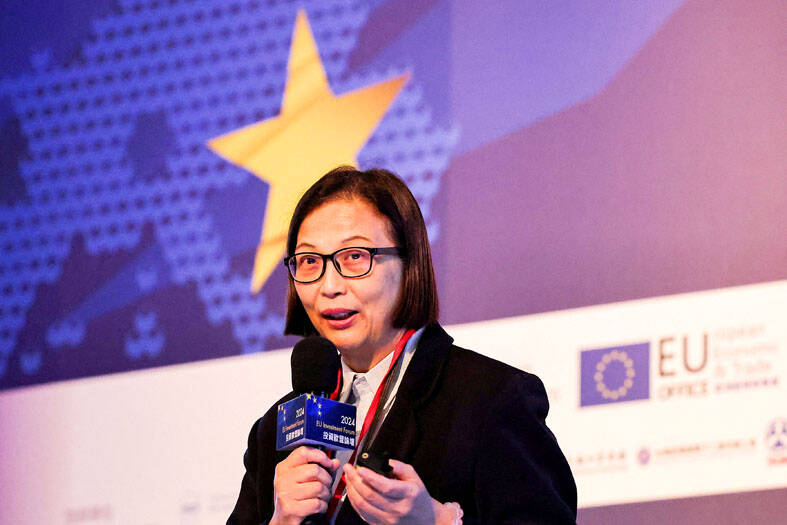GlobalWafers Co (環球晶圓), the world’s third-largest silicon wafer supplier, yesterday said it did not receive any notification from the US CHIPS Program Office regarding potential changes to funding conditions for the firm’s two new fabs under construction in the US.
The company’s remarks came amid speculation that US President Donald Trump is to review the CHIPS and Science Act subsidy requirements.
During his presidential campaign last year, Trump criticized the CHIPS Act and has said he favors tariffs over subsidies to promote the construction of manufacturing facilities in the US.

Photo: Ann Wang, Reuters
“We are not notified to review [the conditions] or to make any adjustments,” GlobalWafers chairwoman Doris Hsu (徐秀蘭) told reporters during an annual media gathering in Hsinchu. “Our strategy is to go global and provide locally made wafers to our customers. If we were really impacted by this, we will have to recalculate before making further investments.”
GlobalWafers would be well-positioned to offset any policy changes or potential tariffs by the US government than other semiconductor firms, given its diversification of manufacturing sites, including in the US, Hsu said.
Since 2022, GlobalWafers has invested in capacity expansion in the US, she said, adding that there were no plans to alter the investment project for the time being.
The company’s goal is to supply locally made wafers to foundry companies and chip designers in the US, which is in line with the US government’s policy, she said.
GlobalWafers expects the US Department of Commerce to disburse the first batch of funding later this year.
The company in December last year said that it would receive US$406 million in subsidies from the US government for two new US fabs under the act.
The grant represents 10 percent of the planned investments of US$4 billion in an advanced 12-inch silicon wafer manufacturing facility in Texas and a 12-inch silicon-on-insulator wafer plant in Missouri.
Those two factories are “essential” to bring chip manufacturing back to the US, Hsu said, citing US media reports.
The Texas fab is to start shipping wafers next quarter at the earliest, she said.
GlobalWafers yesterday also gave its outlook for this year.
“The first quarter would be the bottom. A more marked recovery should be seen in the second half of this year and a more brisk recovery in 2026 based on messages from multiple customers,” Hsu said, adding that demand for advanced silicon wafers is healthy this quarter.
The company expects a recovery for the rest of this year, Hsu said.
This year as a whole would be better than last year, she said.
Last year, GlobalWafers’ revenue declined 11.36 percent to NT$62.63 billion (US$1.91 billion) from NT$70.65 billion a year earlier, attributable to inventory correction and soft demand.

In Italy’s storied gold-making hubs, jewelers are reworking their designs to trim gold content as they race to blunt the effect of record prices and appeal to shoppers watching their budgets. Gold prices hit a record high on Thursday, surging near US$5,600 an ounce, more than double a year ago as geopolitical concerns and jitters over trade pushed investors toward the safe-haven asset. The rally is putting undue pressure on small artisans as they face mounting demands from customers, including international brands, to produce cheaper items, from signature pieces to wedding rings, according to interviews with four independent jewelers in Italy’s main

Japanese Prime Minister Sanae Takaichi has talked up the benefits of a weaker yen in a campaign speech, adopting a tone at odds with her finance ministry, which has refused to rule out any options to counter excessive foreign exchange volatility. Takaichi later softened her stance, saying she did not have a preference for the yen’s direction. “People say the weak yen is bad right now, but for export industries, it’s a major opportunity,” Takaichi said on Saturday at a rally for Liberal Democratic Party candidate Daishiro Yamagiwa in Kanagawa Prefecture ahead of a snap election on Sunday. “Whether it’s selling food or

CONCERNS: Tech companies investing in AI businesses that purchase their products have raised questions among investors that they are artificially propping up demand Nvidia Corp chief executive officer Jensen Huang (黃仁勳) on Saturday said that the company would be participating in OpenAI’s latest funding round, describing it as potentially “the largest investment we’ve ever made.” “We will invest a great deal of money,” Huang told reporters while visiting Taipei. “I believe in OpenAI. The work that they do is incredible. They’re one of the most consequential companies of our time.” Huang did not say exactly how much Nvidia might contribute, but described the investment as “huge.” “Let Sam announce how much he’s going to raise — it’s for him to decide,” Huang said, referring to OpenAI

The global server market is expected to grow 12.8 percent annually this year, with artificial intelligence (AI) servers projected to account for 16.5 percent, driven by continued investment in AI infrastructure by major cloud service providers (CSPs), market researcher TrendForce Corp (集邦科技) said yesterday. Global AI server shipments this year are expected to increase 28 percent year-on-year to more than 2.7 million units, driven by sustained demand from CSPs and government sovereign cloud projects, TrendForce analyst Frank Kung (龔明德) told the Taipei Times. Demand for GPU-based AI servers, including Nvidia Corp’s GB and Vera Rubin rack systems, is expected to remain high,